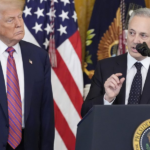“We’re still tracking to offset at least 30% of the $4 billion to $5 billion full-year 2025 tariff impact through strategic actions such as manufacturing adjustments, targeted cost initiatives, and consistent pricing,” GM CFO Paul Jacobson said during the earnings call.
Adjusted automotive free cash flow was $2.8 billion, down $2.5 billion year over year, primarily due to tariff payments as well as headwinds from working capital and lower dealer inventory, Jacobson said.
CEO Mary Barra added that GM’s tariff burden would be lower if tariffs with Mexico, Canada, and Korea were reduced.
Despite year-over-year declines in revenue and ongoing tariff pressures, GM outperformed market expectations across major metrics:
Notably, U.S. sales rose 7%, and the company continued to command strong pricing on pickup trucks and SUVs.
GM remains confident that total tariff expenses will decline as new bilateral trade deals emerge and as sourcing and production adjustments are made, Jacobson noted.
“Our agility and responsiveness to evolving consumer preferences and regulatory demands remain key strengths that set us apart,” he said.
Agility is a particularly relevant concept, as it is now widely regarded as essential for CFOs amid economic volatility, regulatory pressures, shifting supply chains, and rapidly changing market conditions. “As we navigate an era of unreliability, fast actions may differentiate winners from losers,” according to Paul Melville, national managing principal of CFO advisory for Grant Thornton Advisors.
Wedbush analysts see an upside for GM. “While the tariff headlines continue to put further pressure on the bottom line for the foreseeable future, we believe Barra & Co. continues to impressively navigate the complex backdrop,” the analysts wrote in a note to investors Tuesday, adding that this is occurring amid continued high demand for GM’s entire fleet of EVs and internal combustion engine vehicles.
The analysts also noted that, in order to mitigate the long-term impact of tariffs, GM is investing $4 billion to build new U.S. assembly plants—with production set to begin in 2027. Wedbush maintains its Outperform rating.
As investors look to the future, all eyes will be on GM’s ability to stay one step ahead in a rapidly changing market environment.









